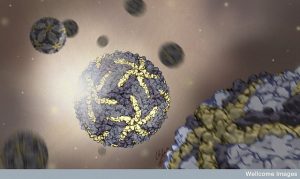An Antibody Protects Mice Fetus Against Zika
Zika virus can be a scary thing. It has such a fearful connotation in our culture. The World Health Organization even called it “a global health emergency.” Much of the research that has been in the news has announced how the Zika virus can cause brain damage in both adults and in an unborn fetus.

This is an illustration of Zika virus particles. There is no cure, but there is hope for a treatment. (Flickr / Creative Commons / Wellcome Images)
A new article actually sheds a more positive light on the Zika virus. A new study indicates that an antibody produced by the human body shields the unborn fetus against contracting Zika. This kind of research creates the hope that there is a possibility of preventing brain damage in an unborn fetus.
Zika virus is mainly transmitted by Aedes mosquitoes. In rare cases, the virus may be sexually transmitted. Symptoms of the virus include mild fever, skin rash, conjunctivitis, muscle and joint pain, malaise or headache, which will last for two to seven days. The neurological conditions I mentioned include microcephaly and Guillain-Barré syndrome, but other neurological conditions might also be the result of Zika.
(See our blog about Zika and the Risk of Microcephaly)
The human antibody reduced levels of the virus in pregnant mothers and fetuses. This discovery gives hope to the idea that there is a treatment for the Zika virus. As of now, there is no cure or vaccine. Viruses can be hard to treat because they live inside the body’s cells, and cannot be treated with antibiotics.
Antibodies are Y-shaped proteins produced by the immune system in response to antigens. Specific antibodies bind to specific antigens, either deactivating them or marking them for destruction. The researchers gave a specific antibody to pregnant mice and found that there placenta stayed normal and healthy, unlike the untreated mice.
Even if the body could naturally produce the antigen, people would still probably need a booster shot for full protection. The booster could serve as a solution for now until scientists develop a vaccine for Zika. The next step would be to test the antibody in monkeys, whose pregnancies are much more similar to human pregnancies. This current study was only done in mice, and there’s still a long way to go before it can be used in humans.